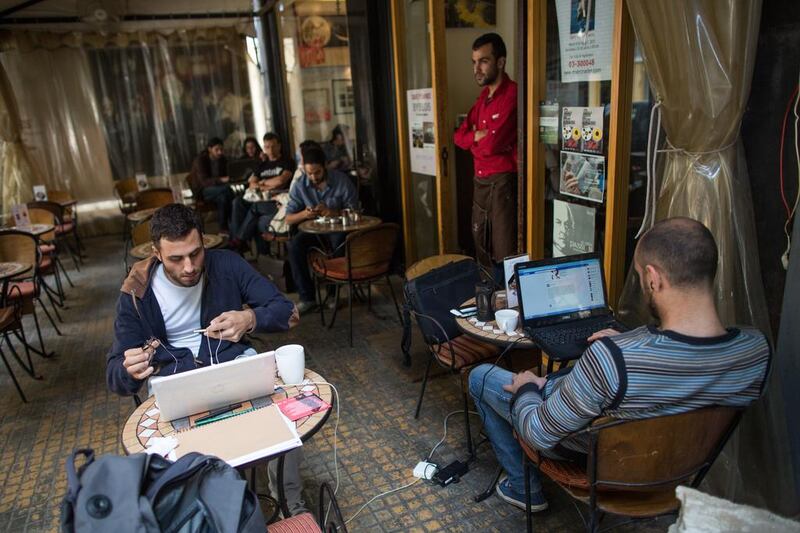BEIRUT // Recent changes in Arabian Gulf states’ policies towards Lebanon – including travel bans or warnings and the withdrawal of US$4 billion in Saudi security aid – are, according to analysts, intended at pushing the Lebanese government away from Hizbollah’s influence.
“The Gulf is trying to send a very strong statement to Lebanon about the role of Hizbollah in Syria, and also to deal with their own domestic issues quickly,” said Theodore Karasik a UAE-based security analyst with Gulf State Analytics.
The shift became visible on February 19, when Saudi Arabia unexpectedly pulled $4bn (Dh14.7bn) in grants to Lebanon’s security forces, citing the “hijacking” of the country by Hizbollah and the refusal of Lebanon’s foreign minister to endorse statements officially condemning mob attacks on Saudi diplomatic missions in Iran. GCC countries, including the UAE, backed Saudi Arabia’s decision.
Then on Tuesday, Saudi Arabia warned its citizens to leave Lebanon, a measure that was joined by Bahrain, Kuwait and Qatar. The UAE announced it was banning citizens from travelling to Lebanon and reducing its diplomatic staff in the country.
The moves have further driven divisions between Lebanon’s pro-Syria March 8 alliance and the anti-Syria, Saudi-backed March 14 alliance. And with hundreds of thousands of Lebanese working in Gulf countries and a strong economic dependence on the Gulf, there is significant concern about a further deterioration of relations.
Saudi Arabia said security concerns were behind its travel warning, but with Lebanon relatively calm at the moment, many in Beirut believe the motivation is Hizbollah’s influence in Lebanon’s government and the Shiite group’s role on the battlefield in Syria.
Hizbollah’s power in Lebanon and its involvement in Syria are nothing new: The group has long been seen as the most powerful faction in the divided country and its troops have been fighting in Syria for nearly four years in support of Syrian president Bashar Al Assad.
But the latest moves come at a time when several Gulf states, along with other countries like Turkey and the US, are increasingly in conversations about a potential ground operation in Syria — a move that could bring them into direct confrontation with Hizbollah. They also come at a time when Saudi Arabia is showcasing its prowess with the region’s largest military exercise ever.
After years of Saudi political and financial support to Lebanese allies having shown limited returns, some say the Saudis could be cutting their losses.
“The Saudis are wondering ... whether it is worth all the support [they give] to a country like Lebanon,” said Imad Salamey, an associate professor of political science at Beirut’s Lebanese American University.
Saudi Arabia’s allies in Lebanon have not only been unable to wane the influence of Hizbollah - they have endorsed friends of the group to become Lebanon’s next president.
The kingdom’s biggest ally, Future Movement leader Saad Hariri, is backing Sleiman Franjieh, a childhood friend of Syria’s president. And Samir Geagea, the head of the Lebanese Forces and another powerful leader in March 14, is supporting Michel Aoun, a man whose Christian party is allied with Hizbollah.
Neither option would please the Saudis or other Gulf states.
In an effort to strengthen and modernise the chronically weak Lebanese army, Saudi Arabia pledged $3bn for arms purchases to Lebanon in 2013. Another $1bn was promised to the security forces the next year.
The grants were believed to be an effort to bolster Lebanon’s state fighting forces and delegitimize Hizbollah’s insinuations that it is the only force strong enough to protect Lebanon. But today, Hizbollah is still protecting large stretches of Lebanon’s border with Syria and fighting alongside government forces inside Syria. There are no efforts by the state to disarm the tens of thousands of fighters in Hizbollah’s militia.
Hizbollah’s opponents in Lebanon have limited abilities in curtailing the group’s power in the country. The country’s justice minister resigned on Sunday over Hizbollah’s domination and there have been veiled threats of further resignations.
But due to its divided nature, the government officially adopts a foreign policy of disassociation — not siding with one side or another in regional conflicts or power struggles while trying to keep everybody happy. Due to the presence of pro-Syria and pro-Iran members, it is unlikely that Lebanon’s government could adopt a foreign policy that would satisfy Saudi Arabia and other Gulf states.
“The Saudis know that Lebanon is divided,” said Sahar Atrache, senior Lebanon analyst at the International Crisis Group. “If they’re expecting that Lebanon will be able to take a coherent policy …this is not realistic.”
“The Saudis think they can influence a shift in the balance, whether that’s real or not on the ground is another question,” said Mr Karasik.
For the most part, Hizbollah’s opponents in Lebanon have been left pleading that Saudi Arabia reconsider its decisions.
As tensions continue to mount, there are fears in Lebanon that Gulf states could take additional measures — particularly ones that would cause economic strain — to put pressure on the Lebanese government.
“The economic well-being of Lebanon is totally dependent on Gulf states,” said Mr Salamey.
jwood@thenational.ae





